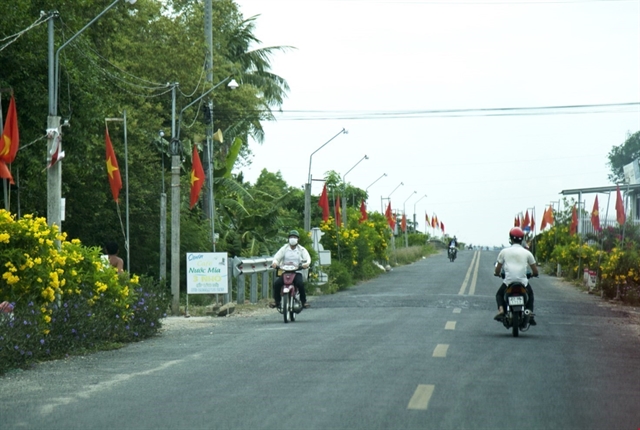 Society
Society

 |
| An upgraded rural road in Sóc Trăng Province’s Trần Đề District. – VNA/VNS Photo Hồng Đạt |
SÓC TRĂNG – The building of new-style rural areas in Sóc Trăng Province has significantly developed the appearance of rural areas and improved the lives of rural people.
Under the country’s programme of building new-style rural areas, the Cửu Long (Mekong) Delta province has built many infrastructure projects in rural areas.
Up to 96 per cent of commune-level roads and 78 per cent of hamlet-level roads have been paved, while the province built and upgraded 164 roads and 20 bridges in rural areas in 2021-23.
The province has 64 communes recognised as new-style rural communes, accounting for 80 per cent of its total communes.
A new-style rural commune must meet the programme’s 19 criteria related to infrastructure, irrigation, electricity, environment, income, education, healthcare, social security, culture and others.
Cù Lao Dung District’s An Thạnh 1 Commune was recognised as the province’s first new-style rural commune in 2014 and as the province’s first advanced new-style rural commune in 2020.
Lê Hoài Thanh, chairman of the An Thạnh 1 Commune People’s Committee, said the quality of advanced new-style rural communes had been improved as the infrastructure had been developed.
The commune has a main commune-level road which is 2,519 metre long, 5.5 metre wide, paved with asphalt and equipped with signs, a lamp system and planted trees.
It has three hamlet-level roads and 34 alley roads, which facilitate travel for local people year-round and link them with the commune’s central area.
It has invested in irrigation systems, saltwater prevention sluices and embankments, and electricity and clean water supply systems to serve agricultural production and the lives of local people.
All schools in the commune have also met regulated standards.
The commune has 1,276ha of fruits such as mango, longan, guava, lime and coconut.
It has three concentrated farming areas for longan and mangos that have been granted production codes for exporting.
It is applying to become an exemplary new-style rural commune and is expected to receive this recognition by the end of this year.
The province’s three district-level localities - Ngã Năm Town, Vĩnh Châu Town and Mỹ Xuyên District - have completed the work of building new-style rural areas.
Đào Đắc Hùng, deputy chairman of the Mỹ Xuyên District People’s Committee, said: “The district has created beautiful, clean and green events such as Green Saturdays and Volunteer Sundays.”
These events have attracted the participation of State officials and local people to grow flowers along alley roads, provincial roads and national highways and clean the environment along the roads.
The district has developed agricultural production in combination with building new-style rural areas, and established and expanded many effective farming models.
Its agricultural production value reaches VNĐ207 million (US$8,600) per hectare a year now, up from VNĐ124 million ($5,100) in 2011.
The province expects to have an additional six communes recognised as new-style rural communes and five existing new-style rural communes recognised as advanced new-style rural communes by the end of this year.
The province’s Châu Thành and Cù Lao Dung districts are estimated to have all their communes recognised as new-style rural communes by year end.
Improve income
The province’s annual per capita income of rural people was VNĐ45.6 million ($1,900) last year, up three times against 2010, according to the province’s Steering Committee for building new-style rural areas.
In rural areas, the number of poor households was 4.75 per cent last year and near-poor households was 7.43 per cent.
The province has invested VNĐ8.3 trillion ($342 million) raised from central and local budgets and other sources for implementing the programme in 2021-23.
The province’s Fatherland Front Committee has co-operated with other socio-political organisations to mobilise funds from various sources to build 4,846 houses worth VNĐ241.5 billion ($1 million) for needy households in 2021-23.
Trần Văn Lâu, chairman of the province People’s Committee, has ordered relevant departments and agencies to implement the programme of building new-style rural areas, including encouraging the public to effectively participate in the programme.
The programme would be implemented in combination with restructuring agricultural production that adapts to climate change and develops sustainably, he said.
The province would effectively implement the country’s “One Commune-One Product” programme, develop high tech agriculture and organic agriculture, and develop brand names and linkages among stakeholders for producing and selling agricultural products.
It would invest in digital infrastructure and transformation for agriculture and rural areas to improve the lives of rural people and boost gender equality. – VNS




